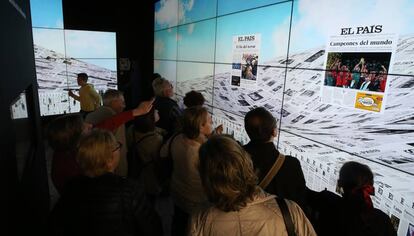EL PAÍS celebrates its 40th anniversary
The newspaper is commemorating four decades of providing information, defending democratic values and serving its readers

The creation of Spanish newspaper EL PAÍS, on May 4, 1976, was more than just a news story. Spain was coming out of the Franco dictatorship, and was just beginning the transition to democracy. EL PAÍS was born from a desire to defend individual freedoms, the need to build a democracy that was comparable to those in Europe, and from the conviction that Spaniards were capable of rebuilding their ability to live together after decades of dictatorship.

That’s how the first editor of the paper and the current chairman of parent group PRISA, Juan Luis Cebrián, explains the history of EL PAÍS in the opening article of special 316-page magazine that is being given away free with the paper today to celebrate its 40th anniversary.
The paper would soon become a reference point for journalism in Spanish, and find its place alongside the most prestigious international publications. Today it is a global newspaper, an integral part of the Ibero-American world, and, thanks to its digital edition, has a global reach and is on the cutting edge in terms of news and technology.
The company, its journalists and other employees were, from the start, focused on the reader, as the only custodians of the right to freedom of expression, as Cebrián writes. The special magazine, whose cover was designed by Rafael Canogar, takes in the most significant events of the last 40 years – from the Cold War and jihadism, to the fall of the Berlin Wall and arrival of the first African American president to the White House. A story where huge personalities were the protagonists, but also one populated by people on the streets, who found an ally in EL PAÍS that helped them consolidate their hopes.
The journalistic adventure that is EL PAÍS always sought professional and corporate independence. “With no hostility toward anyone, but without obligations nor obedience.” This was one of the mottoes of Polanco, who headed Grupo PRISA until his death in 2007. There have been five editors at the helm of the daily since it was founded. Juan Luis Cebrián was followed in 1988 by Joaquín Estefanía, who was replaced by Jesús Ceberio in 1993. Javier Moreno took the reins in 2006, and passed on the baton to Antonio Caño on May 4, 2014.

With a completely refurbished newsroom, which enjoys advanced technology, EL PAÍS is ready to face a global future in the midst of a turbulent time for communication companies. Antonio Caño is clear what the mission will be for this newspaper.
“Right now there are millions of readers out there looking at a screen, waiting to read, see or hear what we have to tell them. Let’s tell them something interesting,” writes Caño in the special magazine. He also confesses that in his office he has hung the famous photo of a group of people reading a special edition of EL PAÍS on the night of February 23, 1981, when an attempted military coup was underway in the Congress building. “I chose that photo so as to never forget the reason why this newspaper exists: to provide the information with which a democratic society can defend itself from the threats that will always lie in wait.”
English version by Simon Hunter.
Tu suscripción se está usando en otro dispositivo
¿Quieres añadir otro usuario a tu suscripción?
Si continúas leyendo en este dispositivo, no se podrá leer en el otro.
FlechaTu suscripción se está usando en otro dispositivo y solo puedes acceder a EL PAÍS desde un dispositivo a la vez.
Si quieres compartir tu cuenta, cambia tu suscripción a la modalidad Premium, así podrás añadir otro usuario. Cada uno accederá con su propia cuenta de email, lo que os permitirá personalizar vuestra experiencia en EL PAÍS.
¿Tienes una suscripción de empresa? Accede aquí para contratar más cuentas.
En el caso de no saber quién está usando tu cuenta, te recomendamos cambiar tu contraseña aquí.
Si decides continuar compartiendo tu cuenta, este mensaje se mostrará en tu dispositivo y en el de la otra persona que está usando tu cuenta de forma indefinida, afectando a tu experiencia de lectura. Puedes consultar aquí los términos y condiciones de la suscripción digital.








































